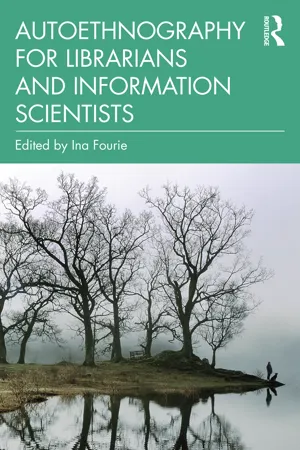
- 216 pages
- English
- ePUB (mobile friendly)
- Available on iOS & Android
Autoethnography for Librarians and Information Scientists
About this book
Autoethnography for Librarians and Information Scientists illustrates that autoethnography is a rich qualitative research method that can enhance understanding of one's own work experiences, whilst also facilitating the design of tailored experiences for a variety of audiences.
Starting with the position that librarians and information scientists require deep insight into people's experiences, needs and information behaviour in order to design appropriate services and information interventions, this book shows that using only conventional methods, such as questionnaires and focus groups, is insufficient. Arguing that autoethnography can provide unique insights into users' cultural experiences and needs, contributors to this volume introduce the reader to different types of autoethnography. Highlighting common challenges and clarifying how autoethnography can be combined with other research methods, this book will empower librarians and information scientists to conceptualise topics for autoethnographic research, whilst also ensuring that they adhere to strict ethical guidelines. Chapters within the volume also demonstrate how to produce autoethnographic writing and stress the need to analyse autoethnographies produced by others.
Autoethnography for Librarians and Information Scientists is essential reading for any librarian, information scientist or student looking to deepen their understanding of their own experiences. It will be particularly useful to those engaged in the study of service provision, user studies and information behaviour.
Tools to learn more effectively

Saving Books

Keyword Search

Annotating Text

Listen to it instead
Information
Table of contents
- Cover
- Half Title
- Title
- Copyright
- Contents
- List of contributors
- List of abbreviations
- Preface and acknowledgements
- PART I Introduction to autoethnography as research method for librarians
- PART II Different types of autoethnography
- PART III Challenges of autoethnography
- PART IV Autoethnography in contexts
- PART V The way forward
- Glossary
- Appendix A: Bibliography of autoethnography in library and information science
- Appendix B: Addresses for websites mentioned in the chapters
- Appendix C: Further reading from related fields
- Index
Frequently asked questions
- Essential is ideal for learners and professionals who enjoy exploring a wide range of subjects. Access the Essential Library with 800,000+ trusted titles and best-sellers across business, personal growth, and the humanities. Includes unlimited reading time and Standard Read Aloud voice.
- Complete: Perfect for advanced learners and researchers needing full, unrestricted access. Unlock 1.4M+ books across hundreds of subjects, including academic and specialized titles. The Complete Plan also includes advanced features like Premium Read Aloud and Research Assistant.
Please note we cannot support devices running on iOS 13 and Android 7 or earlier. Learn more about using the app